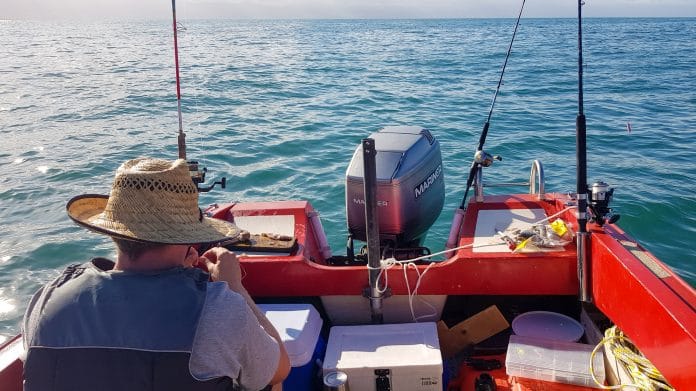Not just for Boats
Rock Fishing brings its own dangers, and being swept off the rocks and not able to get back on is a potential risk. If you are solo, no one else is going to be there to call help on your behalf. It might not even be a case of being in the drink. Getting stuck due to an incoming tide, major injuries on the rocks (slips, trips, knives) could also create a situation where help needs to come to you.
VHF Marine Radios
I already have my UHF Radio needs sorted – and while I would like to also add an ‘old-school’ CB radio (HF/AM CB) to listen in to truckie and motorhome banter – I knew VHF was what was required for Marine Use.
HF/UHF/VHF? What?

Without going into the weeds, the terms refer to what frequency range in the radio spectrum various sets work on.
- HF – High Frequency – 3-30 MHz
- VHF – Very High Frequency – 30-300 MHZ
- UHF – Ultra High Frequency – 300–3000 MHz
Radio systems work within those bands, and, don’t talk to each other. The design of the sets, aerials required, and how the signal bounces (or doesn’t) in, over, around, through materials like buildings or clouds varies.
But essentially, low frequencies tend to be able to travel further, including bouncing off the clouds above to points beyond the horizon, while higher frequencies are closer to a line of sight only, but, can travel through concrete and steel – which tends to reflect the lower frequencies.1
These days, you will find a lot of emergency sets on the lower frequencies (mountain radio for tramping), especially when distance is an issue. Closer communications (between 4wd groups for example) prefer the UHF system as it’s a cleaner, clearer signal).
Regardless, the system that the majority of Maritime Users (including the coastguard) use is VHF – specifically – the Maritime New Zealand VHF (very high frequency) radio network. So – if you are considering a radio system for use on the boat (or on the rocks) – then a Marine VHF Radio system makes the most sense.
Handheld or Mounted?
This really depends on your usage case.
The difference between the two is a bit in the function, sometimes output power, but more so in regards to the aerial size (which also relates to the range) and the battery life of a unit. A mounted unit means you can also run a large aerial and wire it into the boat’s larger battery – while a portable unit has the smaller aerial and runs on internal batteries – though – a day’s boating shouldn’t be an issue for either. If I was headed out to the deep water – I think a further-reaching system would be critical – for the boat size I am generally in – inshore use is the primary concern. The bigger game fishing boats are likely to have a permanent system anyhow.
It is worthwhile to also consider how waterproof your unit is, and, in the case of a handheld, if it floats!
I have a GME GX800W here – which, not only floats should it end up overboard (with or without me!) but also had a bright LED that will flash to make it a bit easier to locate. In my situation, I am spending more time on the rocks, with the occasional trip on my brother’s boat, which is a small boat that doesn’t have a radio on it. So, a portable unit that I can take with me, regardless of where I head off to makes more sense. If I end up with a boat of my own, a permanent install would be in fairly short order.
Important Usage Considerations
First, and very important to know – if you are planning on using the radio for anything more than emergency communications, you are, by law, required to hold a Maritime VHF Operator Certificate. So – if you are wanting to log a trip (which you can also do via their app now) you need to sit the online course. If you are doing that, consider signing up to the Coastguard as it means ‘free’ retrieval should you ever need one, and a discount on the courses.
Channels

Radio systems have channels. These are pre-established frequencies that you broadcast on, and some have a designated use. In the case of Maritime Radio – you have 16 as the mayday/emergency channel – this is monitored 24/7 and is for emergency use only – if your motor doesn’t start, the Coastguard is who you get in contact with.
Beyond that, you have Coastguard Channels, Nowcasting Weather Channels, Interboat channels and more.
Make sure you are using the right channel, otherwise expect no answer or a short explanation you are on the wrong channel.
GMEGX800W

The GX800W has IP67 ingress protection – the 6 in the rating means it is ‘dust proof’ and the 7 means the unit can be dropped into a body of water up to a meter deep for half an hour. Of course, it floats. So it can’t get deeper than that unless you decide to pull it down with you (and I don’t know how its reception works underwater anyhow!)
It can switch between 1/5 watts operating power – and – you can define that power output by channel. So – you could have them in a close inter-boat channel on 1 watt, and the distress or coastguard channel set to the full power 5 watt – which will use more power. However, the battery on these is such that I can’t see you having to worry too much about that anyhow.
In regards to reception strength – I am in the Gardens, Manurewa, and can clearly pick up both the Manukau and Hauraki areas – though, this is as much a function of the transmitting power as it is the receiving unit.
My first night listening in…
I will admit it, I am also the kind of guy who just likes listening to chatter on the radio, be it UHF, VHF, something interests me about hearing what is going on around me. So I find myself tuned in to the ‘local’ coastguard (we can actually see the Manukau Harbour from the front deck) listening to boaties logging ship reports. On the very first night, I had it on while having dinner – I heard a boatie call in with a motor not starting (brand new boat, first time out, not signed up to the Coastguard test, expensive retrieval I imagine), and, listened to the recent emergency rescue of a kayaker out Maraetai Way. In the first case, a quick call back via the radio got the issue sorted, in the second, thankfully, someone spotted the overturned Kayak and alerted authorities.
EPIRB (or PLB)
Option 3 – maybe 2, is going to be an EPIRB or PLB – again – dependant on use. Your boat? Consider a permanently mounted EPIRB.
fishing vessels between 7.5 and 24 metres in length that operate outside of enclosed waters, will be required to have a float-free EPIRB installed onboard.
Again, for my use, on smaller boats (not mine) or heading onto the rocks, a small, portable PLB, like my MT610G suits the bill perfectly. Again, it floats, and, should I need it, the combination of that with my radio and phone will cover any eventually I can conceive of.
Carry them on you. Not in the pack.
Much like best practice tramping with a PLB, don’t store your radio or emergency devices in a backpack, boat console or anywhere else that might get left behind should you end up overboard, pulled off the rocks or anything else. A grab bag is a great idea, but make sure you weigh up the potential risk of you being pulled off wherever you are without it. If you are running solo (maybe not the best practice, but it’s going to happen) then it should be on you, always. Personally, I am working towards a PFD Life Vest, like the Hutchwilco Fisher Pro 150N – because I like to carry a bit of stuff on me all the time, and a vest like this gives me a place to carry the PLB, Radio, Strobe, some tackle, strobe, knife, first aid and all that other stuff I tend to have handy.
Boating Safety Code on the Coastguard Website
I am sure I have butchered that explanation from a technical perspective, but hope it’s adequate for a working, practical explanation. ↩

